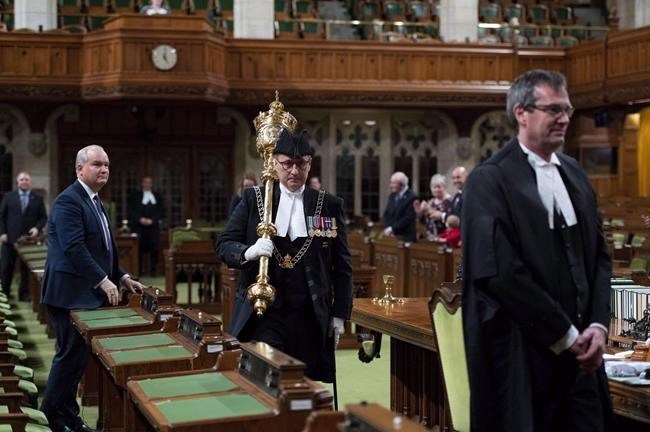OTTAWA — The sergeant-at-arms for the House of Commons says he was "flabbergasted" at how the Ottawa police allowed the harassment of members of Parliament and staffers to go on during the protests against COVID-19 restrictions in the capital earlier this year.
Patrick McDonell, who works closely with the head of the Parliamentary Protective Service, told a Commons committee Tuesday that MPs and their employees faced harassment nearly every day on Wellington Street in downtown Ottawa, which is under the jurisdiction of local police.
McDonell's remarks come as MPs are being given panic buttons to increase their personal security in response to threats and rising concerns about harassment of politicians.
The procedure and House affairs committee is studying whether to expand federal jurisdiction for the security of the precinct around Parliament Hill to include parts of Wellington Street, where vehicles parked for three weeks during the "Freedom Convoy," and Sparks Street, which includes a pedestrian strip.
McDonell said there was a police car "well within viewing distance" of the events he was describing and that the incidents were reported to Ottawa police "every day."
One person would block the cars of some employees as they arrived at a nearby parking lot and if the employee was a woman, the individual would "bang their car" before moving aside, he said.
A woman employee was accosted by a man who tried to throw what appeared to be a bag of human feces at her before another employee arrived and pushed the man to the ground, McDonell added.
When Ottawa interim police chief Steve Bell appeared before the committee in May, he was asked about how many incidents of harassment of MPs and staff he was aware of during the blockades.
Bell said he did not have that information immediately available, and suggested the question may be better suited for RCMP Deputy Commissioner Michael Duheme, "who would be responsible for the initial response to those incidents."
Prime Minister Justin Trudeau said Tuesday there is a "significant amount of anger and frustration" directed at government and officials.
"We need to make sure that anyone who steps up to serve their community at any level of politics is safe and that’s what we’re taking very seriously," said Trudeau.
Public Safety Minister Marco Mendicino said after a cabinet meeting Tuesday he thinks many factors are at play that have made a panic button beneficial for MPs, such as rising online extremist expression that "clearly crosses the Rubicon into criminal content where people receive death threats."
In an earlier interview, Mendicino revealed he has been the subject of death threats on social media in recent weeks after presenting a bill curbing gun ownership.
Carolyn Bennett, minister of mental health and addictions, said after the cabinet meeting that since last summer there have been increasing concerns about the security at the residences of MPs and more protests at the offices of MPs.
Bennett also referenced last year's federal election, where at a campaign event, a handful of gravel was thrown at Trudeau outside a political rally.
"People are executing their anger in ways that I don't think we've seen before," she said.
This report by The Canadian Press was first published June 21, 2022.
---
This story was produced with the financial assistance of the Meta and Canadian Press News Fellowship.
Erika Ibrahim, The Canadian Press
Note to readers: This is a corrected story. A previous version misspelled the surname of Patrick McDonell, the sergeant-at-arms for the House of Commons.



